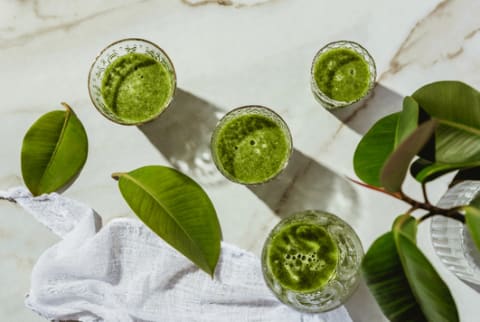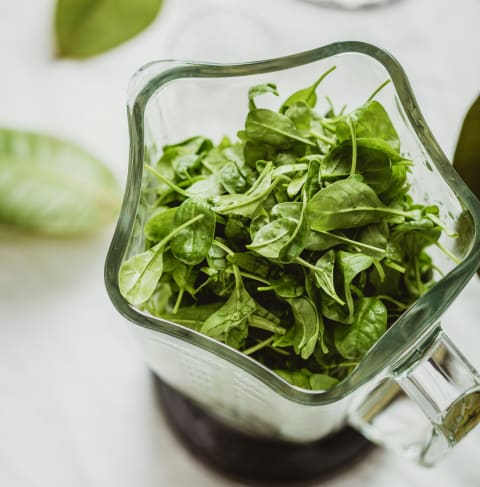Advertisement

The crisp crunch of an apple, the heat of soup on a chilly day, the decadence of a square of dark chocolate—food’s sensory and satisfying richness plants us firmly in the now. What you eat and drink also provides the fuel you need to pursue peak performance for your body, mind and spirit. It follows, then, that if you want to break through stagnant energy in your life, you need to upgrade what you nosh and sip. To take any guesswork out of your energy-giving eating plan, the latest in technology can give you the details only Olympians and doctors used to have at their fingertips.
So if you’re ready to elevate your own diet, tuck into these tidbits.
Optimize what you eat.
The traditional advice about food—eat minimally processed ingredients with an emphasis on vegetables, fruit and healthy proteins—is a fantastic starting point for overall health. You’ll need to look closer at what fills your fridge if you want optimum performance in every aspect of your life, though.
Find the foods most compatible with your unique digestive system with AIRE, a breathalyzer-app combo that can detect your food sensitivities just by analyzing your exhalations. If you’re intolerant to lactose, say, the gas buildup can wreak havoc on your health; AIRE figures out precisely how much of that lactose goes undigested—and tailors dietary suggestions to you (e.g. if you need to cut out dairy completely or if you can get away with a half-cup of gelato). Although the device doesn’t replace working closely with your doctor, naturopath or nutritionist to pinpoint more serious diet-linked issues like Crohn’s disease, the real-time feedback can shift your diet to support the lifestyle you crave.
Once you ID your no-go foods, download NxtNutrio. After you enter your allergies or sensitivities, you can use the app to scan product barcodes at the grocery store. NxtNutrio uses its database of ingredient lists to give you the go-ahead—or a red light—on a box of cereal or frozen enchilada. After all, you have better things to do than pore over every label and puzzle over space age-sounding ingredients.

Make better food choices—the easy way.
It’s one thing to aspire to eating a cleaner, healthier diet—and another one altogether to choose a bran muffin over a bear claw. One way to do this is to avoid confronting the choice in person. When you order a restaurant meal online instead of in the dining room (where you’ll be tempted by another diner’s scrumptious-looking fettuccini Alfredo), you’re more likely to make choices that align with your goals. In fact, a new study from Carnegie Mellon University found that the earlier you order—i.e. before you’re starving and need those fries RIGHT NOW—the healthier dishes you’ll get. (Just be careful to order only what you need—customers tend to add on sides and other extras when ordering on a mobile device versus the phone.)
For grocery shopping, the same principle applies, shows research from the University of Connecticut. When you fill a virtual cart, you’re more likely to stick to your shopping list—and much less likely to impulsively add a package of cinnamon rolls. Most grocery store chains have online ordering and delivery options; services such as Thrive Market make it even easier to choose organic, non-GMO and antibiotic-free ingredients.
To make healthy eating more fun, sign up for SuperBetter, a customizable mobile game that allows you to focus on achieving one goal—say, sticking to the Whole30 diet or detoxing from sugar. You get an instant feeling of gratification from conquering daily “quests” (like going the whole day without refined sugar), and you can personalize the “bad guys” you beat (like your Aunt Anne’s famous German chocolate cake). Research from the University of Pennsylvania showed that playing SuperBetter for a month helped users believe they could achieve their goals.
And all that time you used to spend driving to a restaurant, hunting for a parking spot and wandering the grocery store aisles? Congratulations: You now have extra hours to exercise, meditate, learn Arabic or do whatever else will help you live the life of your dreams.
Hydrate—the right way.
Whether you’re an elite athlete or you just want to operate at peak performance in every aspect of your life, hydration is key: Research shows that even mild dehydration (and its barely perceptible symptoms) can cause fatigue, brain fog, muscle weariness and dampened returns on all your efforts toward a daring life. Nix, a forthcoming, barely noticeable gadget you wear on your hand to measure the makeup of your sweat, alerts you as soon as you become even slightly dehydrated. What’s more, it tells you what to drink and how much—for example, it’ll signal when you need to replace electrolytes, without which your brain and muscles may become sluggish. Nix isn’t available on the market yet, but you can sign up to be considered as a beta tester.
You can also use a MyHydrate bottle, whose cap lights up to track how much water you’ve sipped. Even better, it takes into account local temperature and prompts you to take a drink before you’re dehydrated. And while you’re thinking about fluids, remember to drink an extra glass of water for each boozy beverage you consume. Because alcohol interferes with a hormone that helps your body reabsorb water, you may be like three-quarters of American adults who are chronically dehydrated.
If you’re bored of plain ol’ H2O, infuse your own with cucumber, lime, mint or whatever flavor combo floats your boat. (Try our five fave recipes for infused water!) For fancy water on the go, try health fanatics’ darling coconut water, watermelon water, aloe water or even cactus water. Staying hydrated is a must when you’re manifesting your most authentic, most daring, most fulfilled self.
